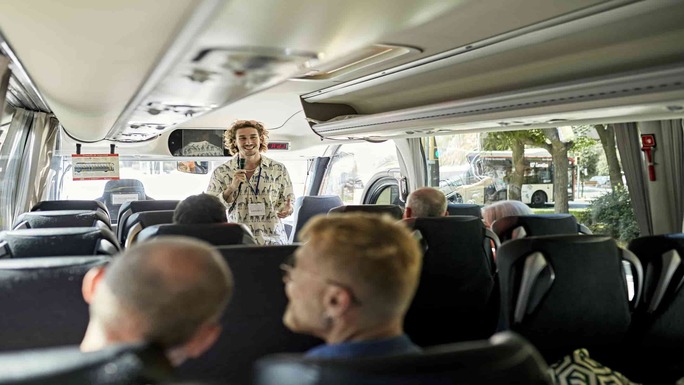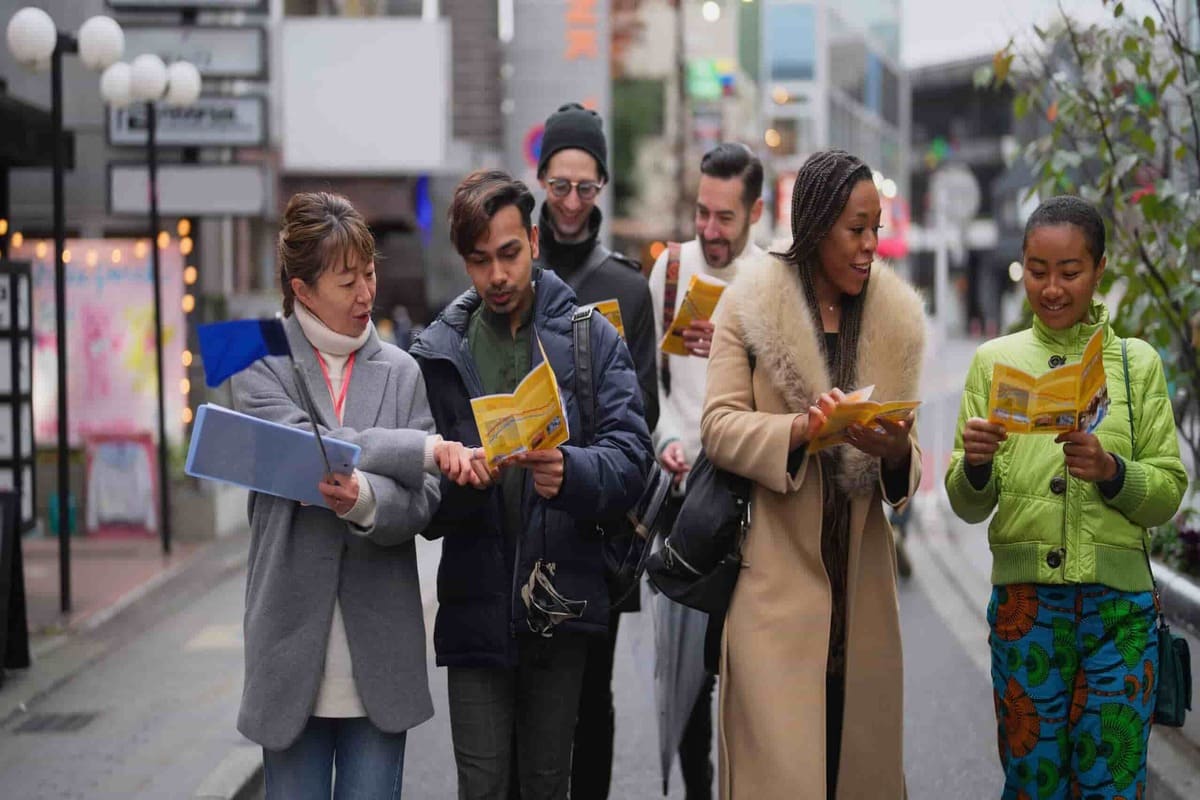Are you someone who loves to explore new places and connect with people from different backgrounds? Are you passionate about sharing your knowledge of fascinating destinations? If so, becoming a tour guide might be the ideal career choice for you. Tourism is bigger business than ever and data from 2022 reveals there were more than 960 million international tourist expeditions, creating many opportunities for tour guides. In this article, we will dive into the thrilling world of tour guiding. We will discuss the essential aspects of this profession, the necessary qualifications, job opportunities, and how to effectively showcase your skills as a potential guide.
What is tour guiding?
Tour guiding goes beyond simply showing people around a destination. It involves escorting individuals or groups to various points of interest, such as historic sites, museums, zoos or gardens, as well as educating and enlightening visitors about the wonderful places they visit. You would also help make sure tourists are safe and comfortable during their visit.
As well as enhancing the overall tourist experience, tour guiding goes beyond mere surface-level guidance. Tour guides serve as a vital link between cultures, fostering understanding and appreciation for our diverse world.
Qualifications and skills needed to be a tour guide
Becoming a tour guide involves obtaining the necessary qualifications, developing essential skills and acquiring extensive knowledge about the chosen destination. This enhances the abilities of a tour guide and enriches the overall experience for tourists.
Educational requirements
One great way to become a tour guide is to get a hospitality degree from a reputable hospitality school. While a degree is not always mandatory, it can offer advantages in the competitive field of tour guiding. Popular majors for aspiring tour guides include history, tourism management, and international relations.
It’s also worth looking into other education and certificates. You might be able to get local guiding qualifications for specific areas. If you’re interested in adventure tours, having additional certifications in areas such as first aid or wilderness survival can boost your employability.
Personality traits and characteristics
Being a successful tour guide is more than simply providing information. It also requires certain personality traits to engage and connect with visitors on a personal level. Among the qualities you’ll need are:
- Communication skills: it is essential you can communicate information effectively to ensure visitors fully comprehend the historical or cultural importance of various sites
- Emotional intelligence: paying attention to guests’ reactions and promptly addressing their questions and requirements helps create memorable experiences
- Organization: you need good organization and time management skills to give tours successfully
Knowledge and expertise
If you’re going to be imparting knowledge of a particular area, you’ll need to know your stuff. Much of what you need to know can be studied, while some you will pick up as you work. The kind of expertise you need to build includes:
- A comprehensive understanding of the geography, culture, history and architecture of destinations
- Knowledge of green tourist activities
- Speaking several languages – this enormously expands your potential audience
Types of tour guides

xavierarnau/E+ via Getty Images
Essentially, this profession is divided into two major categories: local tour guides and international tour guides. While there is a great deal of crossover, these roles are distinct from each other and demand customized skill sets.
Local tour guides
Local guiding is a challenge and an opportunity. To excel at being a local tour guide, you need to possess specialist knowledge of a locale and its historical sites, eateries only locals know and cultural attractions tucked away in back streets.
Some key tips for local tour guides are:
- Organize attraction visits outside peak times and rush hours
- Recommend food destinations to provide travelers with unique gastronomic experiences
- Provide tips about the best shopping destinations for local goods
International tour guides
International tour guides are professionals who are experienced travelers and have acquired comprehensive knowledge.
As with local guiding, you’ll deliver compelling stories filled with details related to the history or culture of visited locations. But there are additional requirements for handling international tours, such as possessing proficiency in multiple languages, managing accommodation and looking after transport logistics.
Working internationally often means you are linked directly with a travel company and this can improve your job prospects globally.
Responsibilities of a tour guide
Tour guides create meaningful experiences connecting tourists with their surroundings. They handle the tourism experience from start to finish, including planning, leading and communicating closely with clients.
Planning tours and itineraries
This is a key task that demands meticulous attention to detail. The focus is on crafting a seamless experience for clients, considering factors such as timing and accessibility. Skillful itinerary design helps ensure memorable experiences for guests.
Leading tours
This includes sharing facts and bringing the culture and history of a place to life. There’s also a lot of behind-the-scenes work, such as being aware of any safety concerns, navigating and ensuring clients are comfortable and engaged.
Effective communication
Communicating well with your clients, potential guests, hotels, attraction staff and restaurants is paramount. Both written and verbal communication skills are essential and will help you organize visits with people from different cultures.
Working conditions of a tour guide
Tour guiding can be an exhilarating career choice, with new adventures around every corner. Nonetheless, before stepping into this exciting profession, it’s important to have a comprehensive understanding of the working conditions involved.
Hours and schedules
As a tour guide, your job schedule will largely depend on the type of tours you conduct. There is no standard ‘nine-to-five’ routine in tour guiding. For example, if you specialize in local guiding for city-oriented landmarks or museums, your shifts would mostly align with their operational hours during the day. Alternatively, if you are involved in eco-tours such as birdwatching, you may find early mornings or dusk are your peak times due to animal activity. You should also expect your working hours to change with the seasons.
Work environment
As you would expect, the tour guiding working environment varies significantly depending upon the location and type of tours led by guides.
If you like the outdoors, you could flourish as a nature guide where your work environment could be national parks, wildlife sanctuaries or botanical gardens. On the other hand, city tour guides specialize in urban settings where architecture and built heritage dominate. For international tour guides, you’ll likely operate in a variety of countries and experience different climates, languages and cultures.
Career path and progression for a tour guide
The path to becoming a tour guide could start with a qualification or through being a junior guide, where your main duties might be welcoming tourists at locations and providing them with general assistance. As you gain experience on the job, expanding your expertise in local guiding or becoming certified, more doors will open for you.
After establishing yourself, you could progress into roles such as senior guide or management, overseeing other guides’ work and devising customized travel plans.
Tour guides may also venture into alternative professions related to their role in other areas, such as:
- Travel advisor: an experienced tour guide may decide to draw on their knowledge about multiple destinations and vacation planning as a travel advisor.
- Destination marketer: using your experience of what attracts people to certain areas, you could transition towards promoting those unique offerings through destination marketing.
If you’re looking to join this exciting field, consider studying hospitality and tourism management. It will provide you with a broader understanding of the travel industry and prepare you for leadership roles in the tourism industry. Be sure to read about the difference between hospitality management degrees and tourism studies to find which type of course suits your goals best.
Current opportunities for a tour guide
There is great potential in tour guiding that can be accessed through various avenues such as apprenticeships, specialized courses and job opportunities.
Apprenticeships
An apprenticeship presents a rich learning experience and could serve as a springboard for those wishing to start their journey as a tour guide. Shadowing seasoned guides, you’ll gain first-hand knowledge about how to become a tour guide and could start leading your own tours, making it a highly practical way to learn.
Courses
If you want to aim for management roles, a specialized degree would help you gain the right skills. A hospitality degree can help you learn how to manage teams in tourism and how to create unforgettable experiences for clients.
Start your journey into tour guiding by learning from industry experts and through professional internships that will help you land exciting roles.

Jobs
As well as with traditional travel agencies and resorts, skilled tour or city guides can find opportunities in a variety of sectors. Museums and historic sites often seek knowledgeable guides, while national parks require experts who can share information and enforce safety regulations. Tour guiding skills are also highly valued in hospitality careers as hotels and resorts aim to enhance guest services.
How to highlight your tour guiding skills
Knowing how to showcase your tour guiding skills effectively in a job application is key if you want to stand out. We’ll focus on putting those skills in a resumé or cover letter and highlighting them in an interview.
On a resumé or cover letter
Your resumé or cover letter gives potential employers their first impression of who you are as a professional. You can make it count in the following ways:
- Starting with your credentials: mention relevant education, training courses and any guiding badges earned from recognized bodies such as the Institute of Tourist Guiding
- Including specifics: start with a list of basic tour guide skills such as organization and public speaking as well as specifics such as local knowledge or language proficiency
- Using examples: describe how you’ve used your skills in previous roles
- Highlighting achievements: provide quantifiable achievements such as boosting customer satisfaction ratings
For the job interview
During interviews, conveying passion will be as important as demonstrating expertise. Some ways you can do this are:
- Discussing why you decided on becoming a tour guide
- Giving specific instances when asked about qualifications or experiences
- Doing your research on the role you’re applying for
- Displaying genuine curiosity and enthusiasm to enhance credibility
Try to ensure each response emphasizes why you consider guiding to be more than just a job and demonstrate how passionate you are to deliver excellence.
Conclusion
Tour guiding is a profession brimming with potential for those who have a passion for history, culture or the outdoors. Tour guides undertake the significant task of rendering unfamiliar places accessible to tourists from various parts of the globe.
The qualifications of a tourist guide go beyond formal education. Acquiring essential skills such as excellent communication skills, enthusiasm, organization and extensive knowledge about various subjects is hugely important. To flourish in your career path as a tour guide and gain a competitive advantage when applying for tour guide jobs, you can gain skills on the job as a tour guide or study a degree in tourism and hospitality.
Photo Credit
Main Image: recep-bg/E+ via Getty Images




